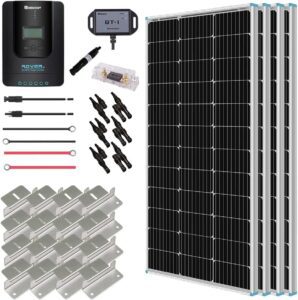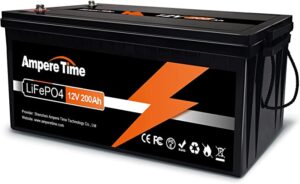Are you trying to decide between Solar vs Generator for your RV? We have been living in, and traveling the country in, our Fifth Wheel RV for over a year now. Like most of us, part of our adventure plan was to get far away from everyone and out into the uncharted wilderness. This brings its own challenges for your day to day RV Living, like water management, waste water, showering and even just keeping your batteries charged.
The age old question of do we go with RV Solar or a Generator is one that we couldn’t answer either, so we got both and have been testing living day to day on one or the other. We are going to go over the nitty gritty of both options with some of the things we have learned along the way so you can be better informed when trying to make the same decision.
What’s In Our RV
This is a key component to this test, as the things you are powering will make a difference in which system will work for you, so I’m going to give you a quick run down on what we have, so you can adjust our findings to suit your setup.
We are traveling in a Montana 381TH (take a walk through tour of our RV here) that has Two AC Units on the roof, that we have added the MicroAir easy start’s to (Link to Installation Video), which will allow you to run Two AC Units on 30 amp service by avoiding the huge power spike when they first kick on.
We also have a Samsung Residential RV Fridge, which runs off a 1500 Watt power inverter when we are not plugged in at a campground, and according to the Info Sticker on it, it uses 360 Watts of power when it is running.
We chose to go with an off the shelf inexpensive option for both our RV Generator and our RV Solar setup in order to make it an ‘Everyone Test‘ that would actually be something all of us could be considering, rather than a generator that could power a small city and a completely custom RV Solar setup.
The RV Generator – $800 at time of purchase
Based solely off of price in comparison to other models available to purchase at commonly available big box stores, we went with the Harbor Freight Predator 3500 Super Quiet Inverter Generator. The basics on this unit are that it maxes out at 25 Amps of power, has everything you need to fire it right up and plug it in to your RV’s 30 amp plug (or adapter) except the quart of oil you need to fill the crankcase beforehand.
The RV Solar – $500 at time of purchase
Based solely off of being an all inclusive kit, available through a single click on Amazon, we went with the Renogy 400 Watt RV Solar Kit. The basic on this kit are that it comes with Four 100 Watt solar panels, the wiring, a 40 amp charge controller, and all needed hardware to install it.
As far as being budget friendly the Renogy RV Solar Kit was already in the lead with a 30% head start out of the gate. Doing a bit deeper of a dive into the installation, we did need to also purchase roof sealant, a caulk gun, and a wire pass through to get the cables down through the roof in a water tight fashion. Still, a win for the Renogy RV Solar kit on the Budget category.
Initial Setup
The Generator – Less than 10 minutes to top off the oil in the crank case, and fire it up for the first time.
The RV Solar – Full day of installation before it was producing any power at all. (Link to Installation Video)
In the Time Until Useable category the win solidly goes to the Predator 3500.
Daily Cost Of Use
The Generator – 2.5 Gallons of gas per 11 hours of run time at a 25% load. Average price of $3.86 per gallon X 2.5 Gallons = $9.65 per 11 half day (day light hours)
The RV Solar – $0.00 per half day (day light hours)
Cost Of Use win goes to the RV Solar Kit.
Annoying Neighbor Factor – Sound Level
The Generator – While it is actually Super Quiet as far as generators go, it does still produce a sound level when running, so if you are in close proximity to other campers there will be an annoyance factor.
The RV Solar – No sound produced. No annoyance factor.
Sound Level win goes to the RV Solar
What Can I Actually Run – Power Factor
The Generator – The Predator 3500 will power your entire RV, as well as run your battery charger to keep your batteries full. Without any additional accessories you can charge your batteries, as well as run a microwave, TV, fans, and an AC unit.
The RV Solar – The Renogy RV Solar Kit will only power the charge controller and keep your batteries charged. Without any additional accessories you can charge your batteries, as well as run anything that only uses 12 Volt power, like your RV Lights, a standard RV 12V/Propane fridge etc.
Power Factor win goes to the Generator
Now this test was to compare the two systems solely on keeping your batteries charged, with an off the shelf system. The Generator does cost more, does have a daily usage cost, and adds more weight to your rig than the RV Solar system. The fact that you can run 120 Volt appliances with it is a bonus win for the generator.
Things To Consider Before Buying
1 – If there are quiet hours where you are camping, usually 10pm to 7am that we have noticed, neither system will be providing power at night. The RV Solar system will start to produce less and less power about 2 hours before sundown until the sun sets, and will not produce power in an appreciable amount until about 2 hours after sunrise.
2 – With either system, there will be an over night draw on your batteries. If the power draw on your batteries is greater than the amount of stored power in your batteries, or more than half the Amp Hours on standard deep cycle batteries that come in most RV’s, you will not make it through the night until you are able to charge them again with the system you choose.
3 – What kind of RV’er are you?
This is going to play an important factor in your decision making process when purchasing one system or the other. If you are like me and want that coffee pot fired up at 7:01 because the percolator over the camp fire just isn’t going to cut it, I would lean towards the Generator
If you don’t mind the percolator, and are just looking to keep the low battery alarm from going off before the sun rises in the morning, I would lean towards the RV Solar Kit.
4 – Side Notes
After living on the road for over a year now I can say that your choice of batteries is going to play a pivotal role in your day to day headaches, with either system you choose, but more so with the RV Solar Kit.
The standard deep cycle batteries that come with your RV are rated in Amp Hours. If you have a 200 Amp Hour Battery, and are using 10 Amps an hour, your battery will last for 20 hours. The Caveat to this is that you can only discharge a Standard Deep Cycle to a maximum of 50%.
So that 200 amp hour battery that according to the math will last 20 hours, is only going to make it a Max of 10, and will have less and less force behind it as the night goes on. Think of it like one of your kids toys who’s batteries are dying, yes it still works, but it goes slower and slower the closer to dead they get.
If you replace the standard deep cycle’s you have with the same size and amp hour rating Lithium Iron Phosphate (LifePo4) you will get a consistent power until it is dead, and you can discharge it to 90% without damaging the battery. They do cost considerably more on the front end, but last between 3 and 10 times longer than their lead acid counterparts.
With the LifePo4 batteries you won’t NEED to fire the generator up at 7:00 on the dot to avoid the battery alarms going off, like we did our first try at boondocking, and be that annoying neighbor who woke everyone up on a Saturday morning. Likewise with the RV Solar Kit you won’t be staring at the horizon hoping the sun will rise faster today than yesterday because the bathroom light is so dim you can’t even find the toilet.
Renogy RV Solar Kit Review, Is It Worth The Money?






